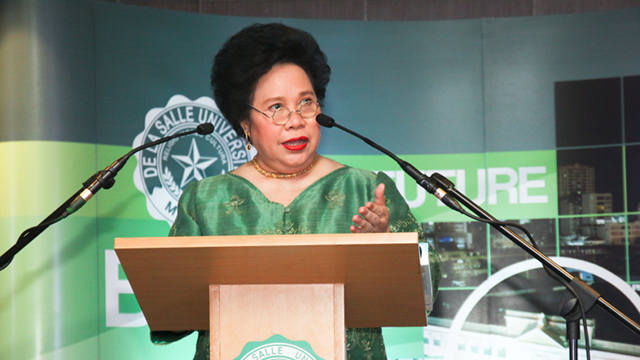SUMMARY
This is AI generated summarization, which may have errors. For context, always refer to the full article.

MANILA, Philippines – Senator Miriam Defensor-Santiago differed with the government position that the new military deal the Philippines is negotiating with the United States does not require Senate approval.
Santiago, chairperson of the Senate foreign relations committee, said the agreement allowing wider and more prolonged access for the US military at Philippine bases should be considered a treaty, requiring concurrence of the Philippine Senate.
The senator said the Philippines cannot consider the deal as an executive agreement because executive agreements only carry out the details of a prior treaty.
“I think they will argue the prior treaty is a Mutual Defense Treaty and they are just carrying out the details, but I will argue to the contrary. Posting the war powers, the war equipment of a foreign sovereign state in our territory is not a minor case of detail. It is a major subject in itself. It cannot be classified as an executive agreement but as a treaty to which the Philippine Senate must give its concurrence,” Santiago told reporters on Friday, March 14.
Santiago issued the statement on the same day Philippine panel chairman Pio Lorenzo Batino said his personal stand is that the deal will not need Senate concurrence.
The senator, an international and constitutional law expert, said it will be better to consider the deal as a treaty to avoid violating the 1987 Philippine Constitution.
“The Senate is going to screen [the deal] because we always fight in the Senate for our power to concur with any ratification made by the President. That will become a constitutional issue. That case will be automatically elevated to the Supreme Court,” she said.
“Besides, we have jurisprudence that a treaty is different from an executive agreement in this sense.”
‘We’re not fighting a war’
Manila signed a Mutual Defense Treaty with Washington in 1951, which states that the two countries shall separately and jointly, by self-help and mutual aid, develop capacity to resist an armed attack.
Santiago said the bases access deal cannot be considered an implementing document of the treaty.
“We’re not fighting a war. China is not interested in a war,” Santiago said.
The senator though acknowledged the need for the Philippines to improve its military.
“We have a self-defense capability of maybe 3 minutes with our Air Force. After 3 minutes, we’re gone,” she quipped.
Santiago is not the first senator to question the bases access deal. In June 2013, Senate Minority Leader Juan Ponce Enrile said the agreement might raise constitutional questions.
“I do not know whether we can establish a refueling station for [foreign military troops]. They can visit and refuel, but to establish a facility for them in the Philippines, that is only a subterfuge in effect to go around the prohibition of the Constitution,” said Enrile, another legal luminary.
The US used to have bases in the Philippines but the Philippine Senate decided in 1991 not to renew the bases treaty in a vote of 12-11. The 12 senators became known as the “Magnificent 12.” Enrile was among those who voted against the treaty.
Despite the questions on the deal, the Philippine panel said the agreement abides by the Constitution. The two panels will hold another round of talks in Manila on March 25 ahead of the visit of US President Barack Obama in late April. Speculation is rife the two sides aim to finish the deal in time for his trip.
The Philippines’ access to US facilities in the military bases became a thorny issue in the negotiations last year but Batino said Friday the US panel already agreed to grant Manila access.
‘China’s divide and conquer tack’
The deal between the Philippines and the US comes as China increasingly becomes aggressive in its maritime dispute with Manila and other claimant countries on the South China Sea.
The agreement is also part of the Obama administration’s so-called US “pivot” or rebalancing to Asia, widely seen as a strategy to counter China’s assertiveness and to help its allies in the region.
Santiago reiterated that China’s claim on the South China Sea (West Philippine Sea for Manila) is based not merely on historical grounds but to gain access to the vast reserves of oil and natural gas believed to be in the area.
She said China prefers a bilateral approach in the negotiations instead of dealing with the Association of Southeast Asian Nations (ASEAN).
“So basically what China is doing is it’s trying to divide ASEAN into separate states and then to negotiate exploitation contracts or joint venture contracts with each state. Of course, each one of us in Southeast Asia will be at a big disadvantage because we’ll be dealing with a Goliath, a hegemon.”
Santiago said the Philippines stands to lose if it agrees to deal with China bilaterally.
“They have all this capital. They have all the major capital equipment necessary and we have nothing so we’ll probably get less than 10% of the income if we allow them to go into our deep sea bed and mine it for oil, natural gas and much more importantly for our minerals.”
“The Philippines is very famous for our minerals. That’s what China is interested in,” Santiago said. – Rappler.com
Add a comment
How does this make you feel?
There are no comments yet. Add your comment to start the conversation.